Research Proposal: Evaluating TQM in Nigerian Oil and Gas Supply Chain
VerifiedAdded on 2023/04/21
|22
|5595
|149
Project
AI Summary
This research proposal investigates the influence of Total Quality Management (TQM) on enhancing supply chain quality and business performance within Nigeria's oil and gas industry. The study aims to assess how TQM can improve the efficiency and effectiveness of supply chain management in this critical sector. The proposal includes a comprehensive literature review, exploring the existing research on the oil and gas industry in Nigeria, supply chain management theories, and the application of TQM. It outlines the research objectives, questions, and methodology, proposing a mixed-methods approach for data collection and analysis. The research seeks to provide recommendations for implementing TQM to optimize supply chain operations, improve quality, and ultimately boost the profitability of oil and gas companies in Nigeria. The research also highlights the significance of the study for both academic and management perspectives, emphasizing the practical implications for industry decision-making and the potential for contributing to the existing body of knowledge. The proposal also includes a reflective writing component, outlining the learning outcomes from the module and the ethical considerations relevant to the research.
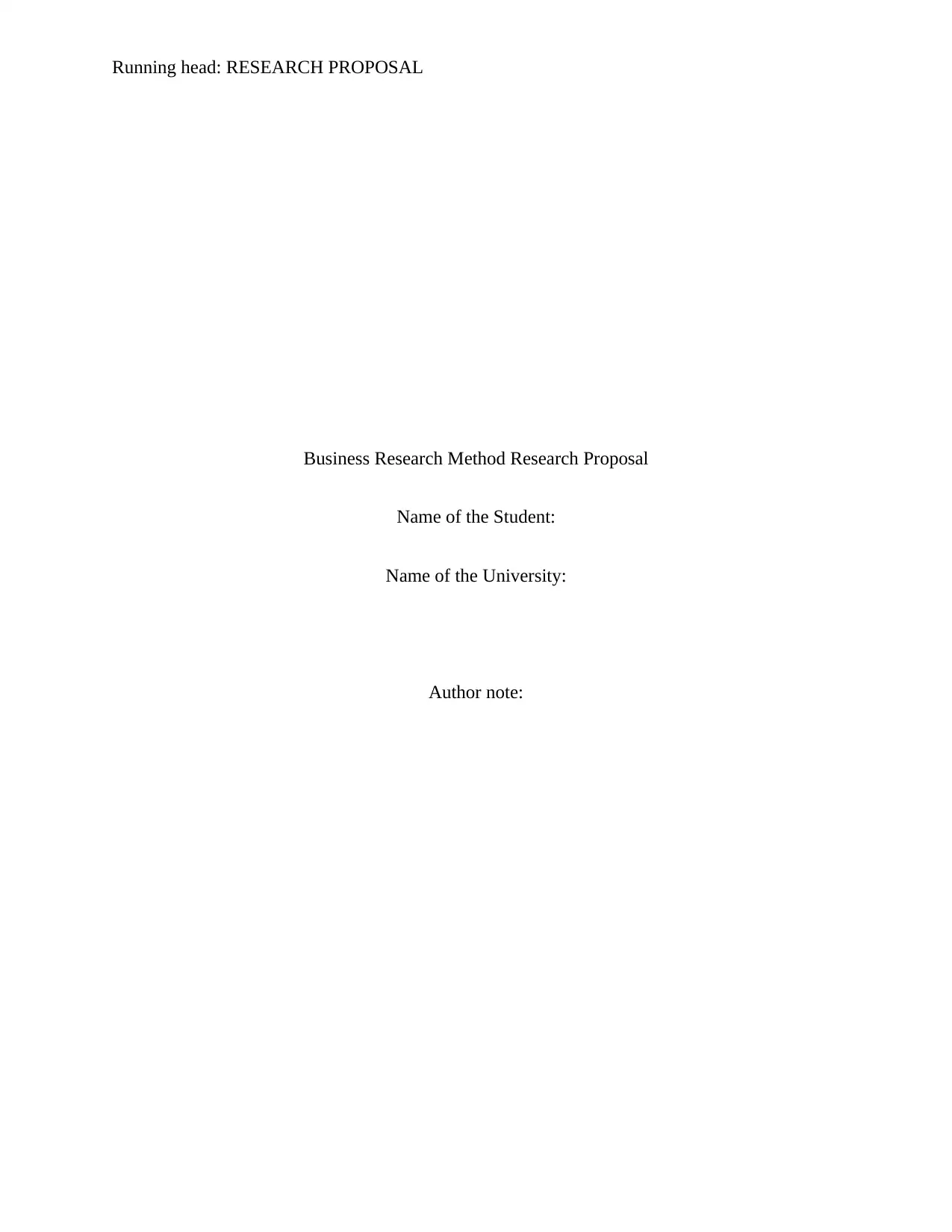
Running head: RESEARCH PROPOSAL
Business Research Method Research Proposal
Name of the Student:
Name of the University:
Author note:
Business Research Method Research Proposal
Name of the Student:
Name of the University:
Author note:
Paraphrase This Document
Need a fresh take? Get an instant paraphrase of this document with our AI Paraphraser
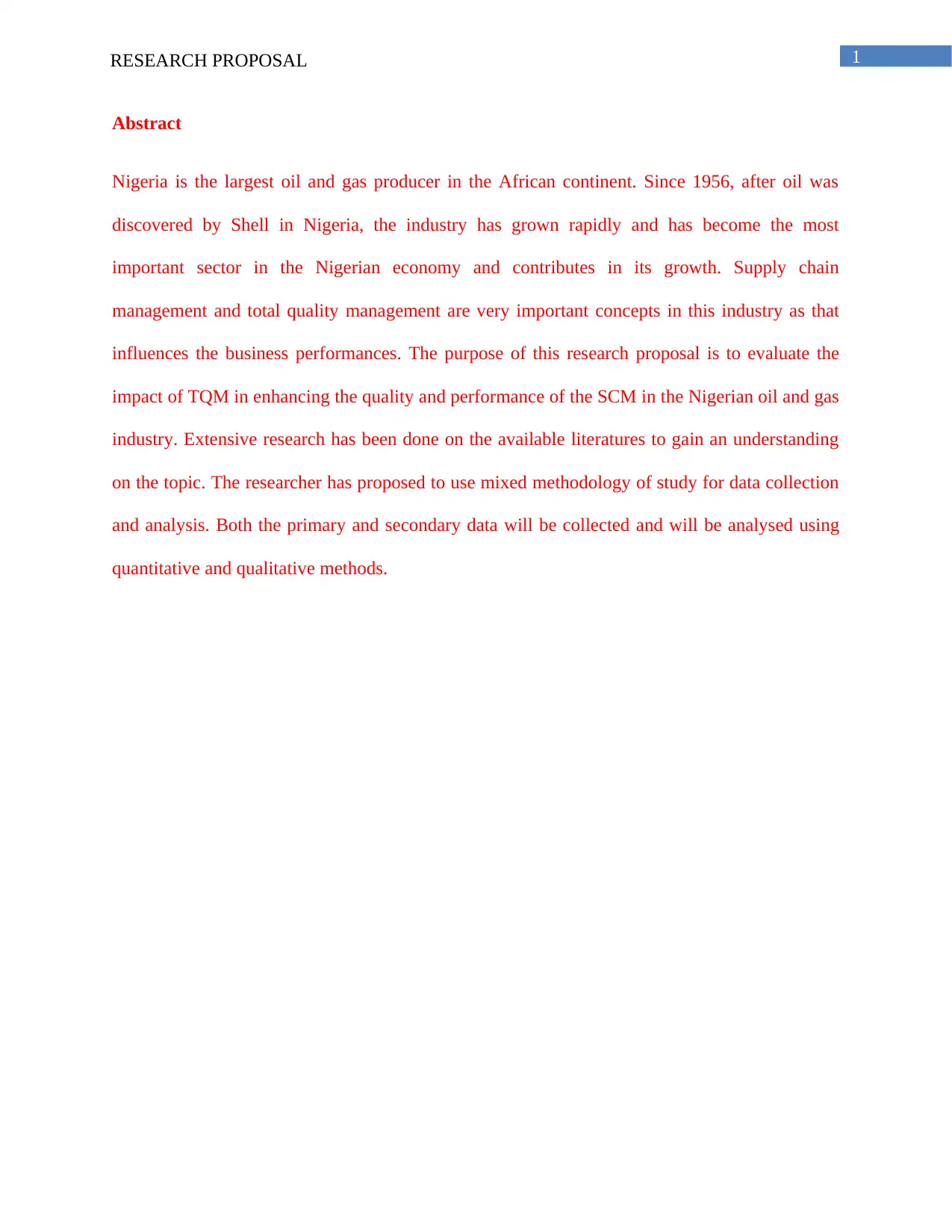
1RESEARCH PROPOSAL
Abstract
Nigeria is the largest oil and gas producer in the African continent. Since 1956, after oil was
discovered by Shell in Nigeria, the industry has grown rapidly and has become the most
important sector in the Nigerian economy and contributes in its growth. Supply chain
management and total quality management are very important concepts in this industry as that
influences the business performances. The purpose of this research proposal is to evaluate the
impact of TQM in enhancing the quality and performance of the SCM in the Nigerian oil and gas
industry. Extensive research has been done on the available literatures to gain an understanding
on the topic. The researcher has proposed to use mixed methodology of study for data collection
and analysis. Both the primary and secondary data will be collected and will be analysed using
quantitative and qualitative methods.
Abstract
Nigeria is the largest oil and gas producer in the African continent. Since 1956, after oil was
discovered by Shell in Nigeria, the industry has grown rapidly and has become the most
important sector in the Nigerian economy and contributes in its growth. Supply chain
management and total quality management are very important concepts in this industry as that
influences the business performances. The purpose of this research proposal is to evaluate the
impact of TQM in enhancing the quality and performance of the SCM in the Nigerian oil and gas
industry. Extensive research has been done on the available literatures to gain an understanding
on the topic. The researcher has proposed to use mixed methodology of study for data collection
and analysis. Both the primary and secondary data will be collected and will be analysed using
quantitative and qualitative methods.
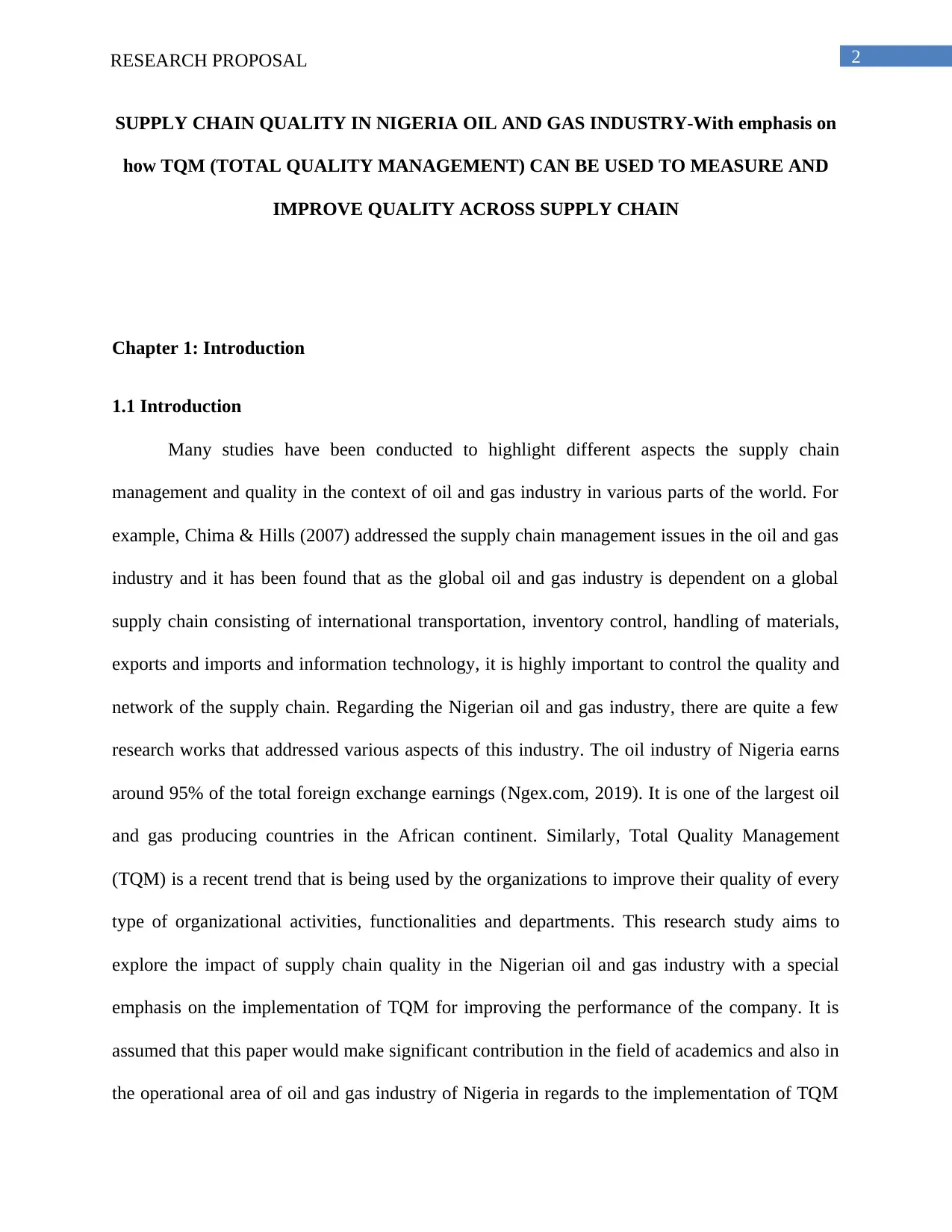
2RESEARCH PROPOSAL
SUPPLY CHAIN QUALITY IN NIGERIA OIL AND GAS INDUSTRY-With emphasis on
how TQM (TOTAL QUALITY MANAGEMENT) CAN BE USED TO MEASURE AND
IMPROVE QUALITY ACROSS SUPPLY CHAIN
Chapter 1: Introduction
1.1 Introduction
Many studies have been conducted to highlight different aspects the supply chain
management and quality in the context of oil and gas industry in various parts of the world. For
example, Chima & Hills (2007) addressed the supply chain management issues in the oil and gas
industry and it has been found that as the global oil and gas industry is dependent on a global
supply chain consisting of international transportation, inventory control, handling of materials,
exports and imports and information technology, it is highly important to control the quality and
network of the supply chain. Regarding the Nigerian oil and gas industry, there are quite a few
research works that addressed various aspects of this industry. The oil industry of Nigeria earns
around 95% of the total foreign exchange earnings (Ngex.com, 2019). It is one of the largest oil
and gas producing countries in the African continent. Similarly, Total Quality Management
(TQM) is a recent trend that is being used by the organizations to improve their quality of every
type of organizational activities, functionalities and departments. This research study aims to
explore the impact of supply chain quality in the Nigerian oil and gas industry with a special
emphasis on the implementation of TQM for improving the performance of the company. It is
assumed that this paper would make significant contribution in the field of academics and also in
the operational area of oil and gas industry of Nigeria in regards to the implementation of TQM
SUPPLY CHAIN QUALITY IN NIGERIA OIL AND GAS INDUSTRY-With emphasis on
how TQM (TOTAL QUALITY MANAGEMENT) CAN BE USED TO MEASURE AND
IMPROVE QUALITY ACROSS SUPPLY CHAIN
Chapter 1: Introduction
1.1 Introduction
Many studies have been conducted to highlight different aspects the supply chain
management and quality in the context of oil and gas industry in various parts of the world. For
example, Chima & Hills (2007) addressed the supply chain management issues in the oil and gas
industry and it has been found that as the global oil and gas industry is dependent on a global
supply chain consisting of international transportation, inventory control, handling of materials,
exports and imports and information technology, it is highly important to control the quality and
network of the supply chain. Regarding the Nigerian oil and gas industry, there are quite a few
research works that addressed various aspects of this industry. The oil industry of Nigeria earns
around 95% of the total foreign exchange earnings (Ngex.com, 2019). It is one of the largest oil
and gas producing countries in the African continent. Similarly, Total Quality Management
(TQM) is a recent trend that is being used by the organizations to improve their quality of every
type of organizational activities, functionalities and departments. This research study aims to
explore the impact of supply chain quality in the Nigerian oil and gas industry with a special
emphasis on the implementation of TQM for improving the performance of the company. It is
assumed that this paper would make significant contribution in the field of academics and also in
the operational area of oil and gas industry of Nigeria in regards to the implementation of TQM
⊘ This is a preview!⊘
Do you want full access?
Subscribe today to unlock all pages.

Trusted by 1+ million students worldwide
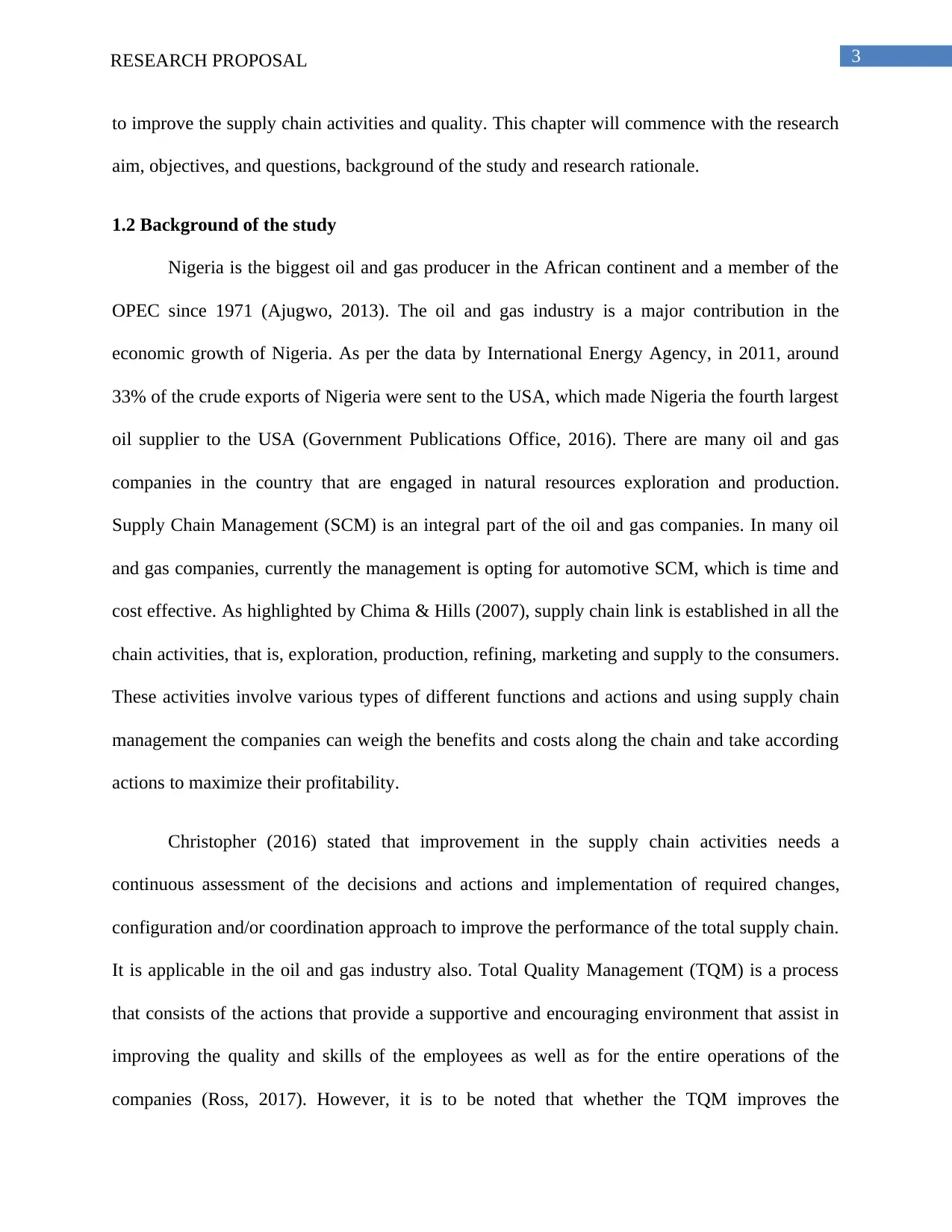
3RESEARCH PROPOSAL
to improve the supply chain activities and quality. This chapter will commence with the research
aim, objectives, and questions, background of the study and research rationale.
1.2 Background of the study
Nigeria is the biggest oil and gas producer in the African continent and a member of the
OPEC since 1971 (Ajugwo, 2013). The oil and gas industry is a major contribution in the
economic growth of Nigeria. As per the data by International Energy Agency, in 2011, around
33% of the crude exports of Nigeria were sent to the USA, which made Nigeria the fourth largest
oil supplier to the USA (Government Publications Office, 2016). There are many oil and gas
companies in the country that are engaged in natural resources exploration and production.
Supply Chain Management (SCM) is an integral part of the oil and gas companies. In many oil
and gas companies, currently the management is opting for automotive SCM, which is time and
cost effective. As highlighted by Chima & Hills (2007), supply chain link is established in all the
chain activities, that is, exploration, production, refining, marketing and supply to the consumers.
These activities involve various types of different functions and actions and using supply chain
management the companies can weigh the benefits and costs along the chain and take according
actions to maximize their profitability.
Christopher (2016) stated that improvement in the supply chain activities needs a
continuous assessment of the decisions and actions and implementation of required changes,
configuration and/or coordination approach to improve the performance of the total supply chain.
It is applicable in the oil and gas industry also. Total Quality Management (TQM) is a process
that consists of the actions that provide a supportive and encouraging environment that assist in
improving the quality and skills of the employees as well as for the entire operations of the
companies (Ross, 2017). However, it is to be noted that whether the TQM improves the
to improve the supply chain activities and quality. This chapter will commence with the research
aim, objectives, and questions, background of the study and research rationale.
1.2 Background of the study
Nigeria is the biggest oil and gas producer in the African continent and a member of the
OPEC since 1971 (Ajugwo, 2013). The oil and gas industry is a major contribution in the
economic growth of Nigeria. As per the data by International Energy Agency, in 2011, around
33% of the crude exports of Nigeria were sent to the USA, which made Nigeria the fourth largest
oil supplier to the USA (Government Publications Office, 2016). There are many oil and gas
companies in the country that are engaged in natural resources exploration and production.
Supply Chain Management (SCM) is an integral part of the oil and gas companies. In many oil
and gas companies, currently the management is opting for automotive SCM, which is time and
cost effective. As highlighted by Chima & Hills (2007), supply chain link is established in all the
chain activities, that is, exploration, production, refining, marketing and supply to the consumers.
These activities involve various types of different functions and actions and using supply chain
management the companies can weigh the benefits and costs along the chain and take according
actions to maximize their profitability.
Christopher (2016) stated that improvement in the supply chain activities needs a
continuous assessment of the decisions and actions and implementation of required changes,
configuration and/or coordination approach to improve the performance of the total supply chain.
It is applicable in the oil and gas industry also. Total Quality Management (TQM) is a process
that consists of the actions that provide a supportive and encouraging environment that assist in
improving the quality and skills of the employees as well as for the entire operations of the
companies (Ross, 2017). However, it is to be noted that whether the TQM improves the
Paraphrase This Document
Need a fresh take? Get an instant paraphrase of this document with our AI Paraphraser
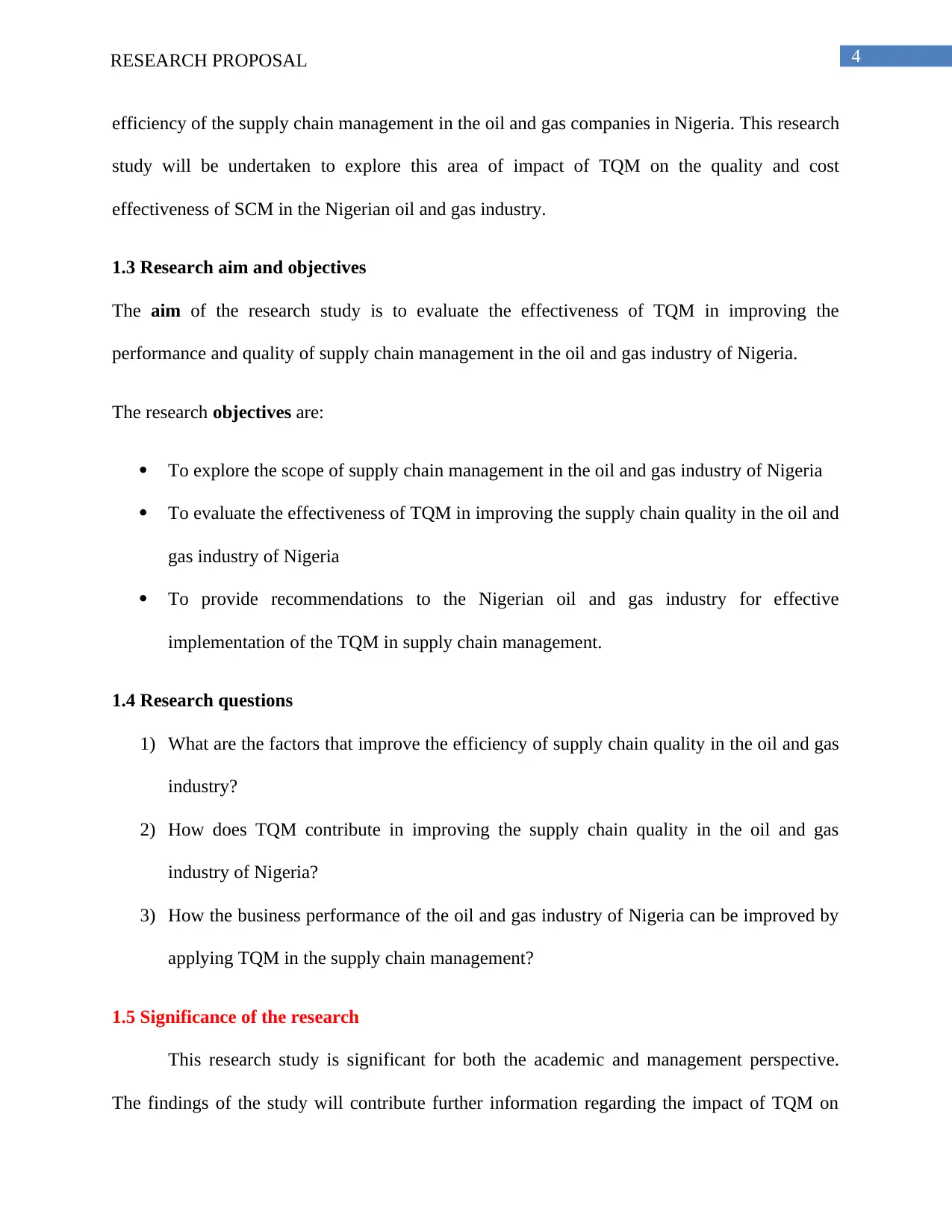
4RESEARCH PROPOSAL
efficiency of the supply chain management in the oil and gas companies in Nigeria. This research
study will be undertaken to explore this area of impact of TQM on the quality and cost
effectiveness of SCM in the Nigerian oil and gas industry.
1.3 Research aim and objectives
The aim of the research study is to evaluate the effectiveness of TQM in improving the
performance and quality of supply chain management in the oil and gas industry of Nigeria.
The research objectives are:
To explore the scope of supply chain management in the oil and gas industry of Nigeria
To evaluate the effectiveness of TQM in improving the supply chain quality in the oil and
gas industry of Nigeria
To provide recommendations to the Nigerian oil and gas industry for effective
implementation of the TQM in supply chain management.
1.4 Research questions
1) What are the factors that improve the efficiency of supply chain quality in the oil and gas
industry?
2) How does TQM contribute in improving the supply chain quality in the oil and gas
industry of Nigeria?
3) How the business performance of the oil and gas industry of Nigeria can be improved by
applying TQM in the supply chain management?
1.5 Significance of the research
This research study is significant for both the academic and management perspective.
The findings of the study will contribute further information regarding the impact of TQM on
efficiency of the supply chain management in the oil and gas companies in Nigeria. This research
study will be undertaken to explore this area of impact of TQM on the quality and cost
effectiveness of SCM in the Nigerian oil and gas industry.
1.3 Research aim and objectives
The aim of the research study is to evaluate the effectiveness of TQM in improving the
performance and quality of supply chain management in the oil and gas industry of Nigeria.
The research objectives are:
To explore the scope of supply chain management in the oil and gas industry of Nigeria
To evaluate the effectiveness of TQM in improving the supply chain quality in the oil and
gas industry of Nigeria
To provide recommendations to the Nigerian oil and gas industry for effective
implementation of the TQM in supply chain management.
1.4 Research questions
1) What are the factors that improve the efficiency of supply chain quality in the oil and gas
industry?
2) How does TQM contribute in improving the supply chain quality in the oil and gas
industry of Nigeria?
3) How the business performance of the oil and gas industry of Nigeria can be improved by
applying TQM in the supply chain management?
1.5 Significance of the research
This research study is significant for both the academic and management perspective.
The findings of the study will contribute further information regarding the impact of TQM on
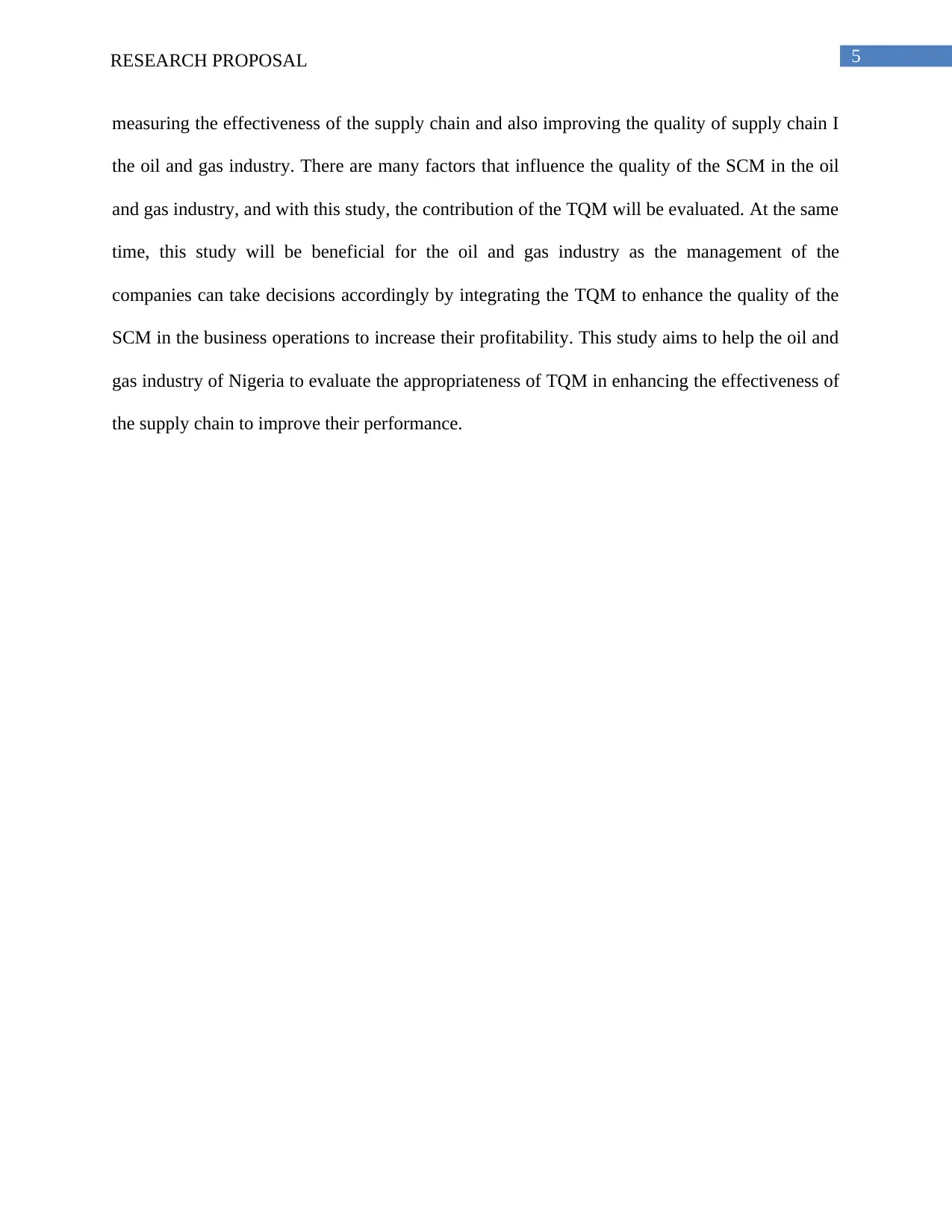
5RESEARCH PROPOSAL
measuring the effectiveness of the supply chain and also improving the quality of supply chain I
the oil and gas industry. There are many factors that influence the quality of the SCM in the oil
and gas industry, and with this study, the contribution of the TQM will be evaluated. At the same
time, this study will be beneficial for the oil and gas industry as the management of the
companies can take decisions accordingly by integrating the TQM to enhance the quality of the
SCM in the business operations to increase their profitability. This study aims to help the oil and
gas industry of Nigeria to evaluate the appropriateness of TQM in enhancing the effectiveness of
the supply chain to improve their performance.
measuring the effectiveness of the supply chain and also improving the quality of supply chain I
the oil and gas industry. There are many factors that influence the quality of the SCM in the oil
and gas industry, and with this study, the contribution of the TQM will be evaluated. At the same
time, this study will be beneficial for the oil and gas industry as the management of the
companies can take decisions accordingly by integrating the TQM to enhance the quality of the
SCM in the business operations to increase their profitability. This study aims to help the oil and
gas industry of Nigeria to evaluate the appropriateness of TQM in enhancing the effectiveness of
the supply chain to improve their performance.
⊘ This is a preview!⊘
Do you want full access?
Subscribe today to unlock all pages.

Trusted by 1+ million students worldwide
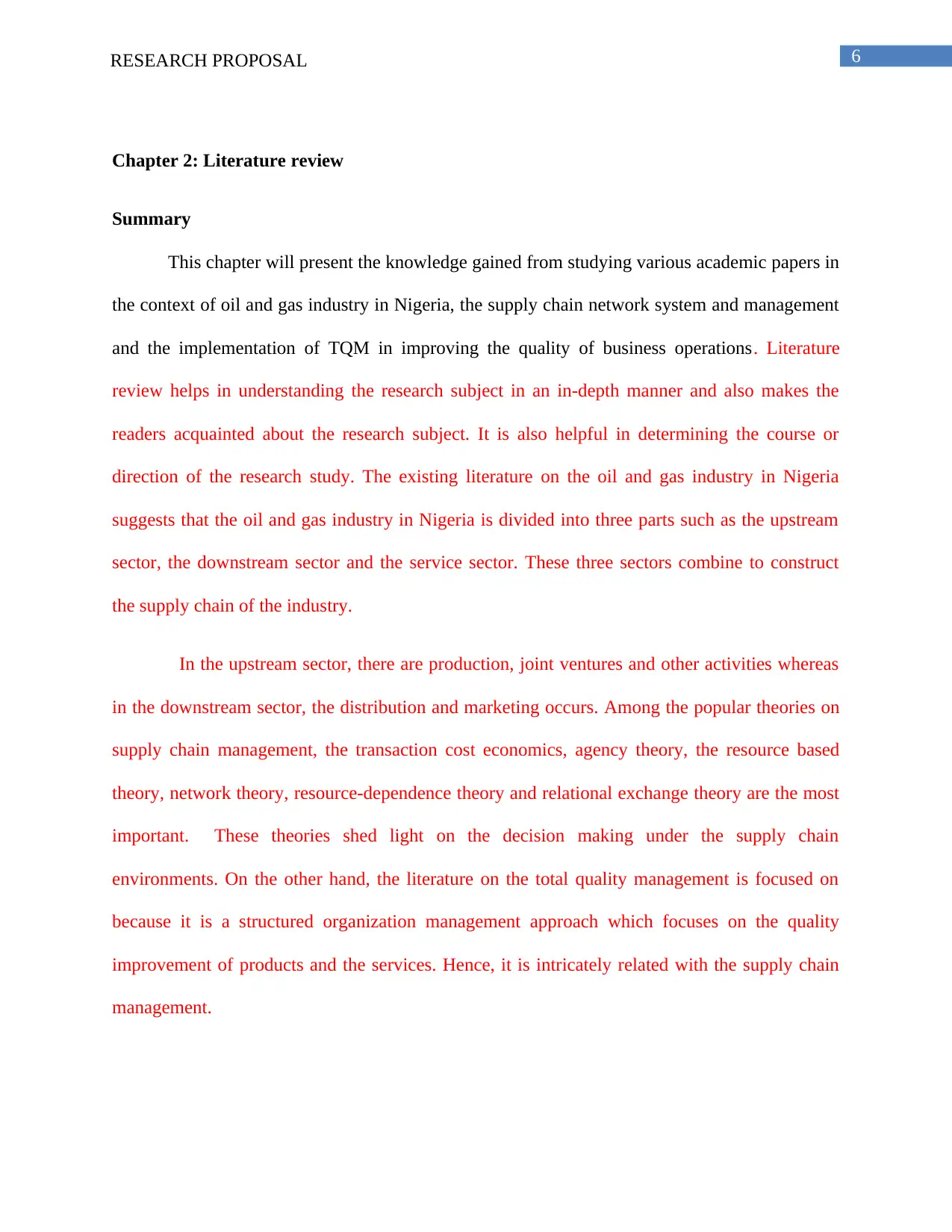
6RESEARCH PROPOSAL
Chapter 2: Literature review
Summary
This chapter will present the knowledge gained from studying various academic papers in
the context of oil and gas industry in Nigeria, the supply chain network system and management
and the implementation of TQM in improving the quality of business operations. Literature
review helps in understanding the research subject in an in-depth manner and also makes the
readers acquainted about the research subject. It is also helpful in determining the course or
direction of the research study. The existing literature on the oil and gas industry in Nigeria
suggests that the oil and gas industry in Nigeria is divided into three parts such as the upstream
sector, the downstream sector and the service sector. These three sectors combine to construct
the supply chain of the industry.
In the upstream sector, there are production, joint ventures and other activities whereas
in the downstream sector, the distribution and marketing occurs. Among the popular theories on
supply chain management, the transaction cost economics, agency theory, the resource based
theory, network theory, resource-dependence theory and relational exchange theory are the most
important. These theories shed light on the decision making under the supply chain
environments. On the other hand, the literature on the total quality management is focused on
because it is a structured organization management approach which focuses on the quality
improvement of products and the services. Hence, it is intricately related with the supply chain
management.
Chapter 2: Literature review
Summary
This chapter will present the knowledge gained from studying various academic papers in
the context of oil and gas industry in Nigeria, the supply chain network system and management
and the implementation of TQM in improving the quality of business operations. Literature
review helps in understanding the research subject in an in-depth manner and also makes the
readers acquainted about the research subject. It is also helpful in determining the course or
direction of the research study. The existing literature on the oil and gas industry in Nigeria
suggests that the oil and gas industry in Nigeria is divided into three parts such as the upstream
sector, the downstream sector and the service sector. These three sectors combine to construct
the supply chain of the industry.
In the upstream sector, there are production, joint ventures and other activities whereas
in the downstream sector, the distribution and marketing occurs. Among the popular theories on
supply chain management, the transaction cost economics, agency theory, the resource based
theory, network theory, resource-dependence theory and relational exchange theory are the most
important. These theories shed light on the decision making under the supply chain
environments. On the other hand, the literature on the total quality management is focused on
because it is a structured organization management approach which focuses on the quality
improvement of products and the services. Hence, it is intricately related with the supply chain
management.
Paraphrase This Document
Need a fresh take? Get an instant paraphrase of this document with our AI Paraphraser
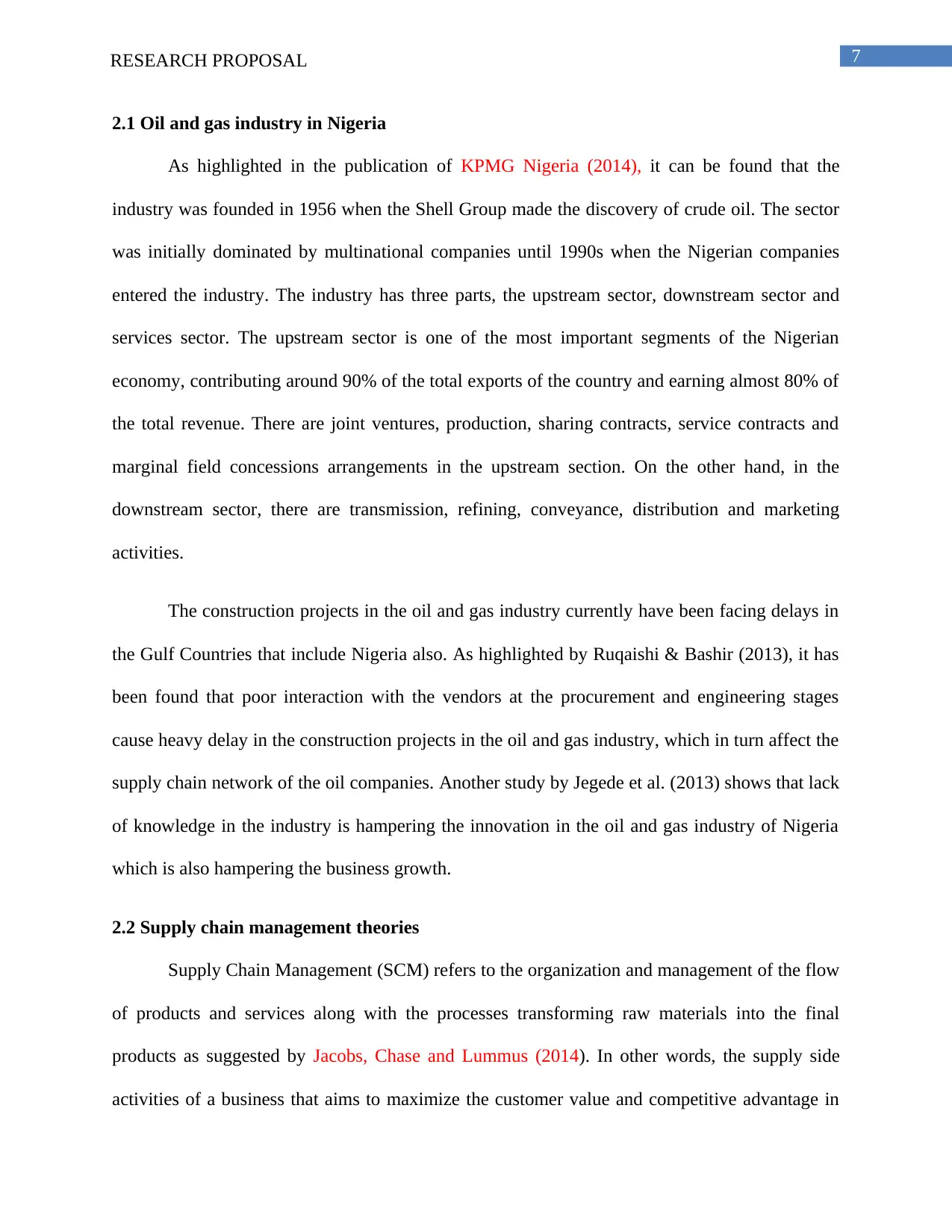
7RESEARCH PROPOSAL
2.1 Oil and gas industry in Nigeria
As highlighted in the publication of KPMG Nigeria (2014), it can be found that the
industry was founded in 1956 when the Shell Group made the discovery of crude oil. The sector
was initially dominated by multinational companies until 1990s when the Nigerian companies
entered the industry. The industry has three parts, the upstream sector, downstream sector and
services sector. The upstream sector is one of the most important segments of the Nigerian
economy, contributing around 90% of the total exports of the country and earning almost 80% of
the total revenue. There are joint ventures, production, sharing contracts, service contracts and
marginal field concessions arrangements in the upstream section. On the other hand, in the
downstream sector, there are transmission, refining, conveyance, distribution and marketing
activities.
The construction projects in the oil and gas industry currently have been facing delays in
the Gulf Countries that include Nigeria also. As highlighted by Ruqaishi & Bashir (2013), it has
been found that poor interaction with the vendors at the procurement and engineering stages
cause heavy delay in the construction projects in the oil and gas industry, which in turn affect the
supply chain network of the oil companies. Another study by Jegede et al. (2013) shows that lack
of knowledge in the industry is hampering the innovation in the oil and gas industry of Nigeria
which is also hampering the business growth.
2.2 Supply chain management theories
Supply Chain Management (SCM) refers to the organization and management of the flow
of products and services along with the processes transforming raw materials into the final
products as suggested by Jacobs, Chase and Lummus (2014). In other words, the supply side
activities of a business that aims to maximize the customer value and competitive advantage in
2.1 Oil and gas industry in Nigeria
As highlighted in the publication of KPMG Nigeria (2014), it can be found that the
industry was founded in 1956 when the Shell Group made the discovery of crude oil. The sector
was initially dominated by multinational companies until 1990s when the Nigerian companies
entered the industry. The industry has three parts, the upstream sector, downstream sector and
services sector. The upstream sector is one of the most important segments of the Nigerian
economy, contributing around 90% of the total exports of the country and earning almost 80% of
the total revenue. There are joint ventures, production, sharing contracts, service contracts and
marginal field concessions arrangements in the upstream section. On the other hand, in the
downstream sector, there are transmission, refining, conveyance, distribution and marketing
activities.
The construction projects in the oil and gas industry currently have been facing delays in
the Gulf Countries that include Nigeria also. As highlighted by Ruqaishi & Bashir (2013), it has
been found that poor interaction with the vendors at the procurement and engineering stages
cause heavy delay in the construction projects in the oil and gas industry, which in turn affect the
supply chain network of the oil companies. Another study by Jegede et al. (2013) shows that lack
of knowledge in the industry is hampering the innovation in the oil and gas industry of Nigeria
which is also hampering the business growth.
2.2 Supply chain management theories
Supply Chain Management (SCM) refers to the organization and management of the flow
of products and services along with the processes transforming raw materials into the final
products as suggested by Jacobs, Chase and Lummus (2014). In other words, the supply side
activities of a business that aims to maximize the customer value and competitive advantage in
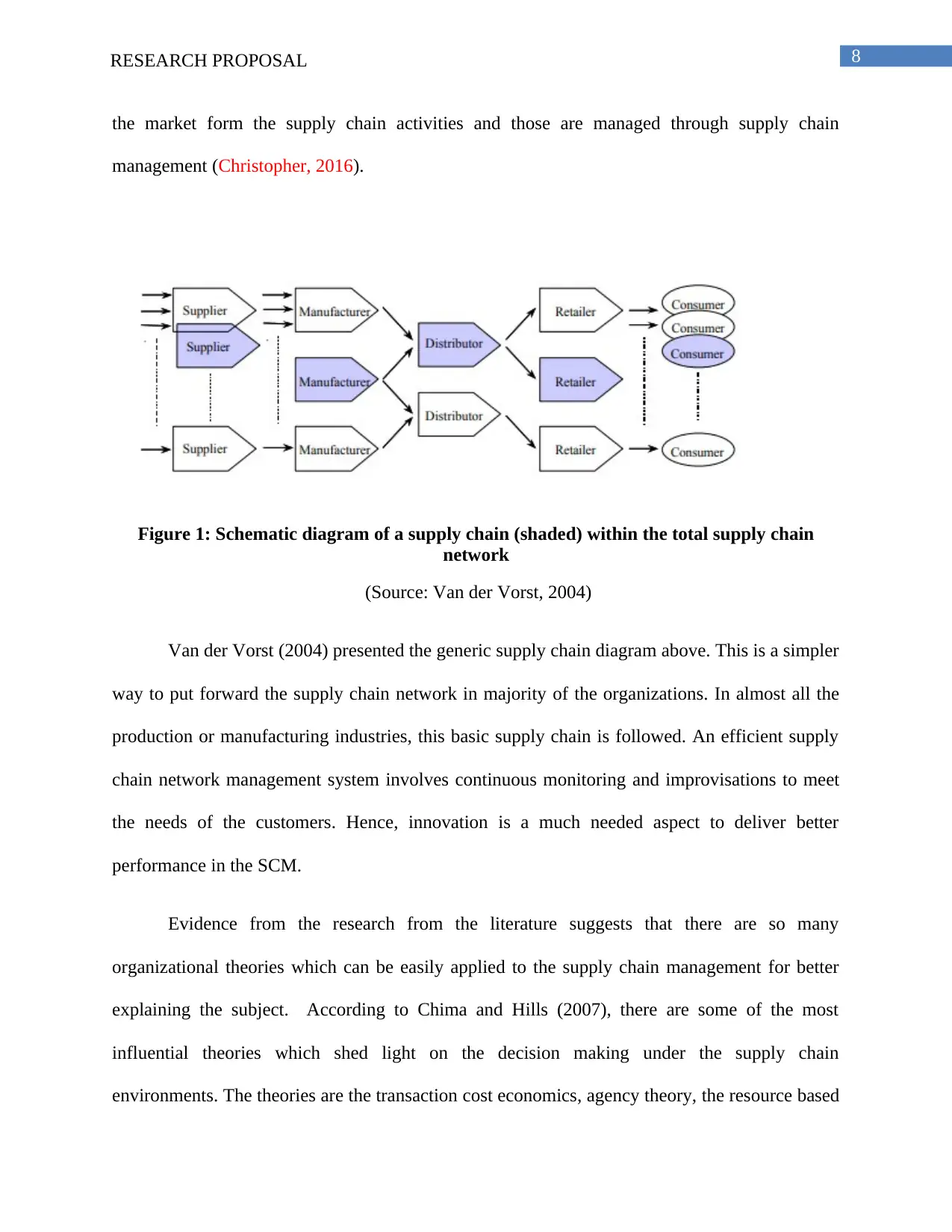
8RESEARCH PROPOSAL
the market form the supply chain activities and those are managed through supply chain
management (Christopher, 2016).
Figure 1: Schematic diagram of a supply chain (shaded) within the total supply chain
network
(Source: Van der Vorst, 2004)
Van der Vorst (2004) presented the generic supply chain diagram above. This is a simpler
way to put forward the supply chain network in majority of the organizations. In almost all the
production or manufacturing industries, this basic supply chain is followed. An efficient supply
chain network management system involves continuous monitoring and improvisations to meet
the needs of the customers. Hence, innovation is a much needed aspect to deliver better
performance in the SCM.
Evidence from the research from the literature suggests that there are so many
organizational theories which can be easily applied to the supply chain management for better
explaining the subject. According to Chima and Hills (2007), there are some of the most
influential theories which shed light on the decision making under the supply chain
environments. The theories are the transaction cost economics, agency theory, the resource based
the market form the supply chain activities and those are managed through supply chain
management (Christopher, 2016).
Figure 1: Schematic diagram of a supply chain (shaded) within the total supply chain
network
(Source: Van der Vorst, 2004)
Van der Vorst (2004) presented the generic supply chain diagram above. This is a simpler
way to put forward the supply chain network in majority of the organizations. In almost all the
production or manufacturing industries, this basic supply chain is followed. An efficient supply
chain network management system involves continuous monitoring and improvisations to meet
the needs of the customers. Hence, innovation is a much needed aspect to deliver better
performance in the SCM.
Evidence from the research from the literature suggests that there are so many
organizational theories which can be easily applied to the supply chain management for better
explaining the subject. According to Chima and Hills (2007), there are some of the most
influential theories which shed light on the decision making under the supply chain
environments. The theories are the transaction cost economics, agency theory, the resource based
⊘ This is a preview!⊘
Do you want full access?
Subscribe today to unlock all pages.

Trusted by 1+ million students worldwide
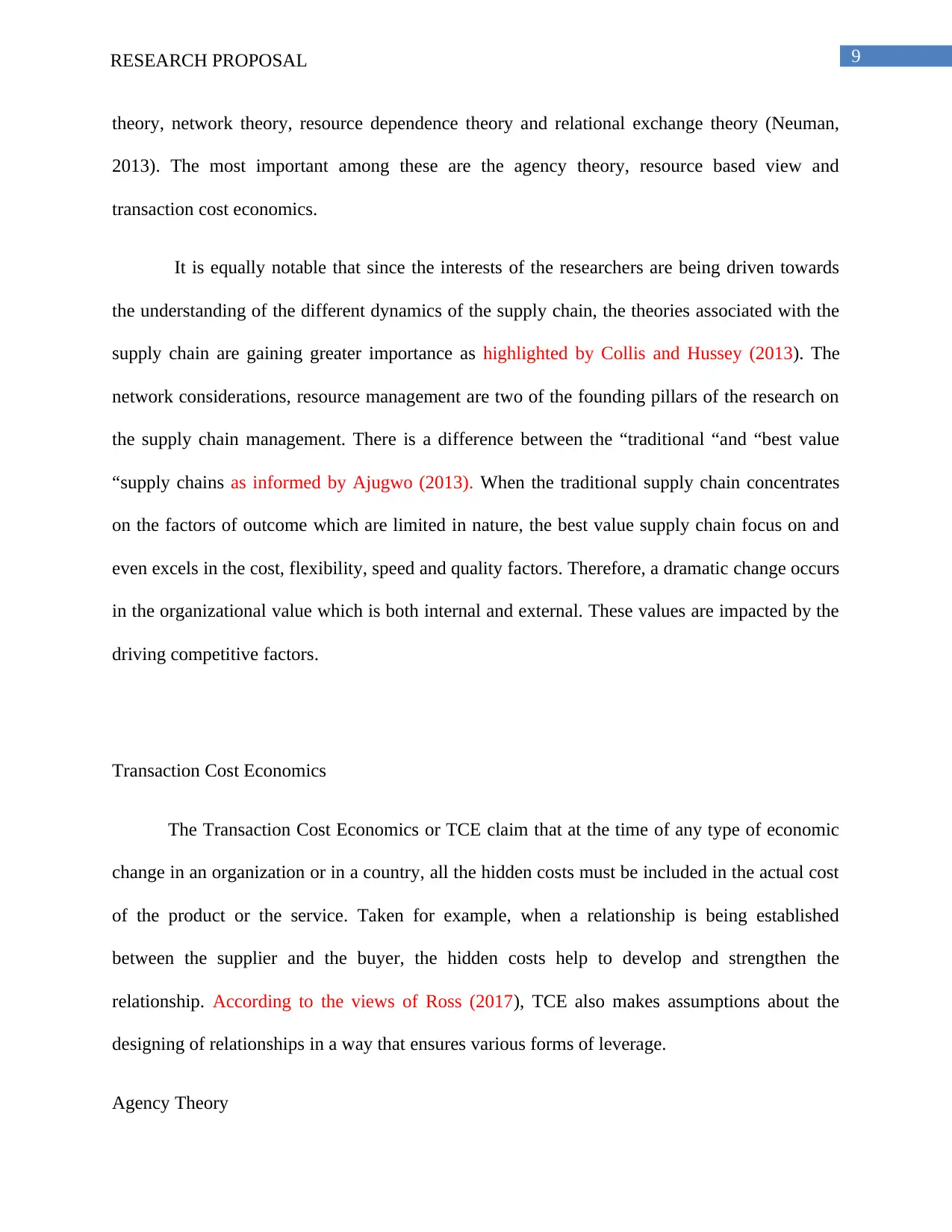
9RESEARCH PROPOSAL
theory, network theory, resource dependence theory and relational exchange theory (Neuman,
2013). The most important among these are the agency theory, resource based view and
transaction cost economics.
It is equally notable that since the interests of the researchers are being driven towards
the understanding of the different dynamics of the supply chain, the theories associated with the
supply chain are gaining greater importance as highlighted by Collis and Hussey (2013). The
network considerations, resource management are two of the founding pillars of the research on
the supply chain management. There is a difference between the “traditional “and “best value
“supply chains as informed by Ajugwo (2013). When the traditional supply chain concentrates
on the factors of outcome which are limited in nature, the best value supply chain focus on and
even excels in the cost, flexibility, speed and quality factors. Therefore, a dramatic change occurs
in the organizational value which is both internal and external. These values are impacted by the
driving competitive factors.
Transaction Cost Economics
The Transaction Cost Economics or TCE claim that at the time of any type of economic
change in an organization or in a country, all the hidden costs must be included in the actual cost
of the product or the service. Taken for example, when a relationship is being established
between the supplier and the buyer, the hidden costs help to develop and strengthen the
relationship. According to the views of Ross (2017), TCE also makes assumptions about the
designing of relationships in a way that ensures various forms of leverage.
Agency Theory
theory, network theory, resource dependence theory and relational exchange theory (Neuman,
2013). The most important among these are the agency theory, resource based view and
transaction cost economics.
It is equally notable that since the interests of the researchers are being driven towards
the understanding of the different dynamics of the supply chain, the theories associated with the
supply chain are gaining greater importance as highlighted by Collis and Hussey (2013). The
network considerations, resource management are two of the founding pillars of the research on
the supply chain management. There is a difference between the “traditional “and “best value
“supply chains as informed by Ajugwo (2013). When the traditional supply chain concentrates
on the factors of outcome which are limited in nature, the best value supply chain focus on and
even excels in the cost, flexibility, speed and quality factors. Therefore, a dramatic change occurs
in the organizational value which is both internal and external. These values are impacted by the
driving competitive factors.
Transaction Cost Economics
The Transaction Cost Economics or TCE claim that at the time of any type of economic
change in an organization or in a country, all the hidden costs must be included in the actual cost
of the product or the service. Taken for example, when a relationship is being established
between the supplier and the buyer, the hidden costs help to develop and strengthen the
relationship. According to the views of Ross (2017), TCE also makes assumptions about the
designing of relationships in a way that ensures various forms of leverage.
Agency Theory
Paraphrase This Document
Need a fresh take? Get an instant paraphrase of this document with our AI Paraphraser
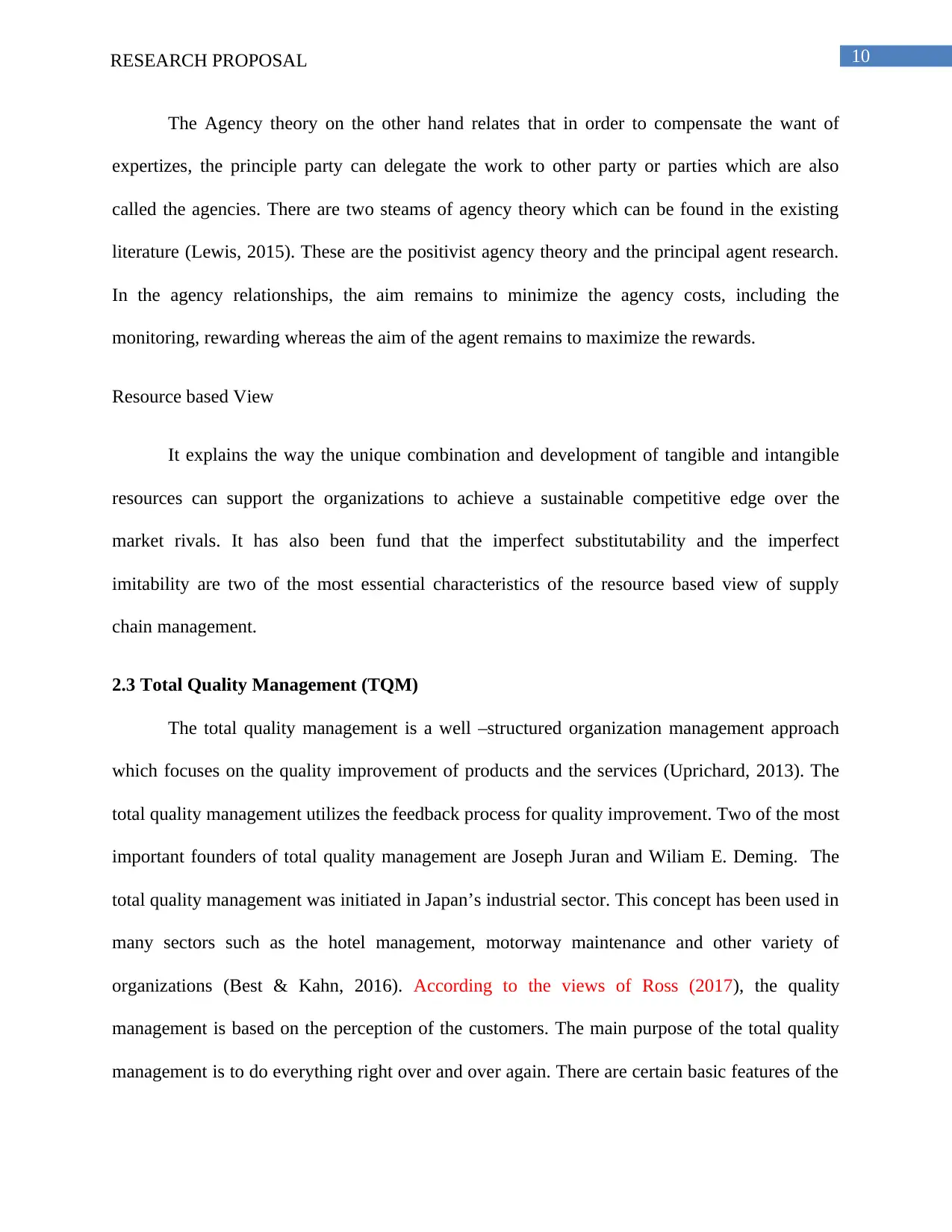
10RESEARCH PROPOSAL
The Agency theory on the other hand relates that in order to compensate the want of
expertizes, the principle party can delegate the work to other party or parties which are also
called the agencies. There are two steams of agency theory which can be found in the existing
literature (Lewis, 2015). These are the positivist agency theory and the principal agent research.
In the agency relationships, the aim remains to minimize the agency costs, including the
monitoring, rewarding whereas the aim of the agent remains to maximize the rewards.
Resource based View
It explains the way the unique combination and development of tangible and intangible
resources can support the organizations to achieve a sustainable competitive edge over the
market rivals. It has also been fund that the imperfect substitutability and the imperfect
imitability are two of the most essential characteristics of the resource based view of supply
chain management.
2.3 Total Quality Management (TQM)
The total quality management is a well –structured organization management approach
which focuses on the quality improvement of products and the services (Uprichard, 2013). The
total quality management utilizes the feedback process for quality improvement. Two of the most
important founders of total quality management are Joseph Juran and Wiliam E. Deming. The
total quality management was initiated in Japan’s industrial sector. This concept has been used in
many sectors such as the hotel management, motorway maintenance and other variety of
organizations (Best & Kahn, 2016). According to the views of Ross (2017), the quality
management is based on the perception of the customers. The main purpose of the total quality
management is to do everything right over and over again. There are certain basic features of the
The Agency theory on the other hand relates that in order to compensate the want of
expertizes, the principle party can delegate the work to other party or parties which are also
called the agencies. There are two steams of agency theory which can be found in the existing
literature (Lewis, 2015). These are the positivist agency theory and the principal agent research.
In the agency relationships, the aim remains to minimize the agency costs, including the
monitoring, rewarding whereas the aim of the agent remains to maximize the rewards.
Resource based View
It explains the way the unique combination and development of tangible and intangible
resources can support the organizations to achieve a sustainable competitive edge over the
market rivals. It has also been fund that the imperfect substitutability and the imperfect
imitability are two of the most essential characteristics of the resource based view of supply
chain management.
2.3 Total Quality Management (TQM)
The total quality management is a well –structured organization management approach
which focuses on the quality improvement of products and the services (Uprichard, 2013). The
total quality management utilizes the feedback process for quality improvement. Two of the most
important founders of total quality management are Joseph Juran and Wiliam E. Deming. The
total quality management was initiated in Japan’s industrial sector. This concept has been used in
many sectors such as the hotel management, motorway maintenance and other variety of
organizations (Best & Kahn, 2016). According to the views of Ross (2017), the quality
management is based on the perception of the customers. The main purpose of the total quality
management is to do everything right over and over again. There are certain basic features of the
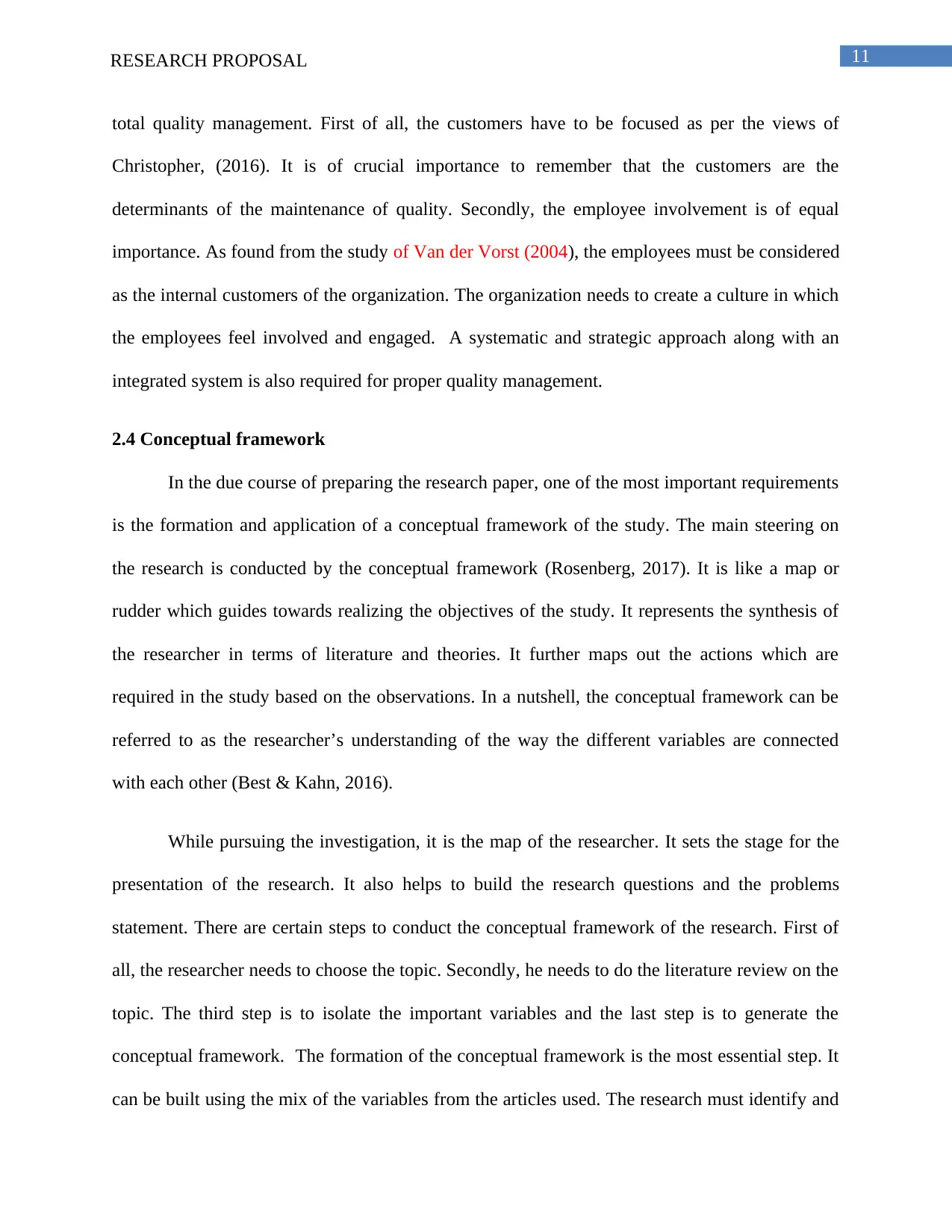
11RESEARCH PROPOSAL
total quality management. First of all, the customers have to be focused as per the views of
Christopher, (2016). It is of crucial importance to remember that the customers are the
determinants of the maintenance of quality. Secondly, the employee involvement is of equal
importance. As found from the study of Van der Vorst (2004), the employees must be considered
as the internal customers of the organization. The organization needs to create a culture in which
the employees feel involved and engaged. A systematic and strategic approach along with an
integrated system is also required for proper quality management.
2.4 Conceptual framework
In the due course of preparing the research paper, one of the most important requirements
is the formation and application of a conceptual framework of the study. The main steering on
the research is conducted by the conceptual framework (Rosenberg, 2017). It is like a map or
rudder which guides towards realizing the objectives of the study. It represents the synthesis of
the researcher in terms of literature and theories. It further maps out the actions which are
required in the study based on the observations. In a nutshell, the conceptual framework can be
referred to as the researcher’s understanding of the way the different variables are connected
with each other (Best & Kahn, 2016).
While pursuing the investigation, it is the map of the researcher. It sets the stage for the
presentation of the research. It also helps to build the research questions and the problems
statement. There are certain steps to conduct the conceptual framework of the research. First of
all, the researcher needs to choose the topic. Secondly, he needs to do the literature review on the
topic. The third step is to isolate the important variables and the last step is to generate the
conceptual framework. The formation of the conceptual framework is the most essential step. It
can be built using the mix of the variables from the articles used. The research must identify and
total quality management. First of all, the customers have to be focused as per the views of
Christopher, (2016). It is of crucial importance to remember that the customers are the
determinants of the maintenance of quality. Secondly, the employee involvement is of equal
importance. As found from the study of Van der Vorst (2004), the employees must be considered
as the internal customers of the organization. The organization needs to create a culture in which
the employees feel involved and engaged. A systematic and strategic approach along with an
integrated system is also required for proper quality management.
2.4 Conceptual framework
In the due course of preparing the research paper, one of the most important requirements
is the formation and application of a conceptual framework of the study. The main steering on
the research is conducted by the conceptual framework (Rosenberg, 2017). It is like a map or
rudder which guides towards realizing the objectives of the study. It represents the synthesis of
the researcher in terms of literature and theories. It further maps out the actions which are
required in the study based on the observations. In a nutshell, the conceptual framework can be
referred to as the researcher’s understanding of the way the different variables are connected
with each other (Best & Kahn, 2016).
While pursuing the investigation, it is the map of the researcher. It sets the stage for the
presentation of the research. It also helps to build the research questions and the problems
statement. There are certain steps to conduct the conceptual framework of the research. First of
all, the researcher needs to choose the topic. Secondly, he needs to do the literature review on the
topic. The third step is to isolate the important variables and the last step is to generate the
conceptual framework. The formation of the conceptual framework is the most essential step. It
can be built using the mix of the variables from the articles used. The research must identify and
⊘ This is a preview!⊘
Do you want full access?
Subscribe today to unlock all pages.

Trusted by 1+ million students worldwide
1 out of 22
Related Documents
Your All-in-One AI-Powered Toolkit for Academic Success.
+13062052269
info@desklib.com
Available 24*7 on WhatsApp / Email
![[object Object]](/_next/static/media/star-bottom.7253800d.svg)
Unlock your academic potential
Copyright © 2020–2026 A2Z Services. All Rights Reserved. Developed and managed by ZUCOL.





